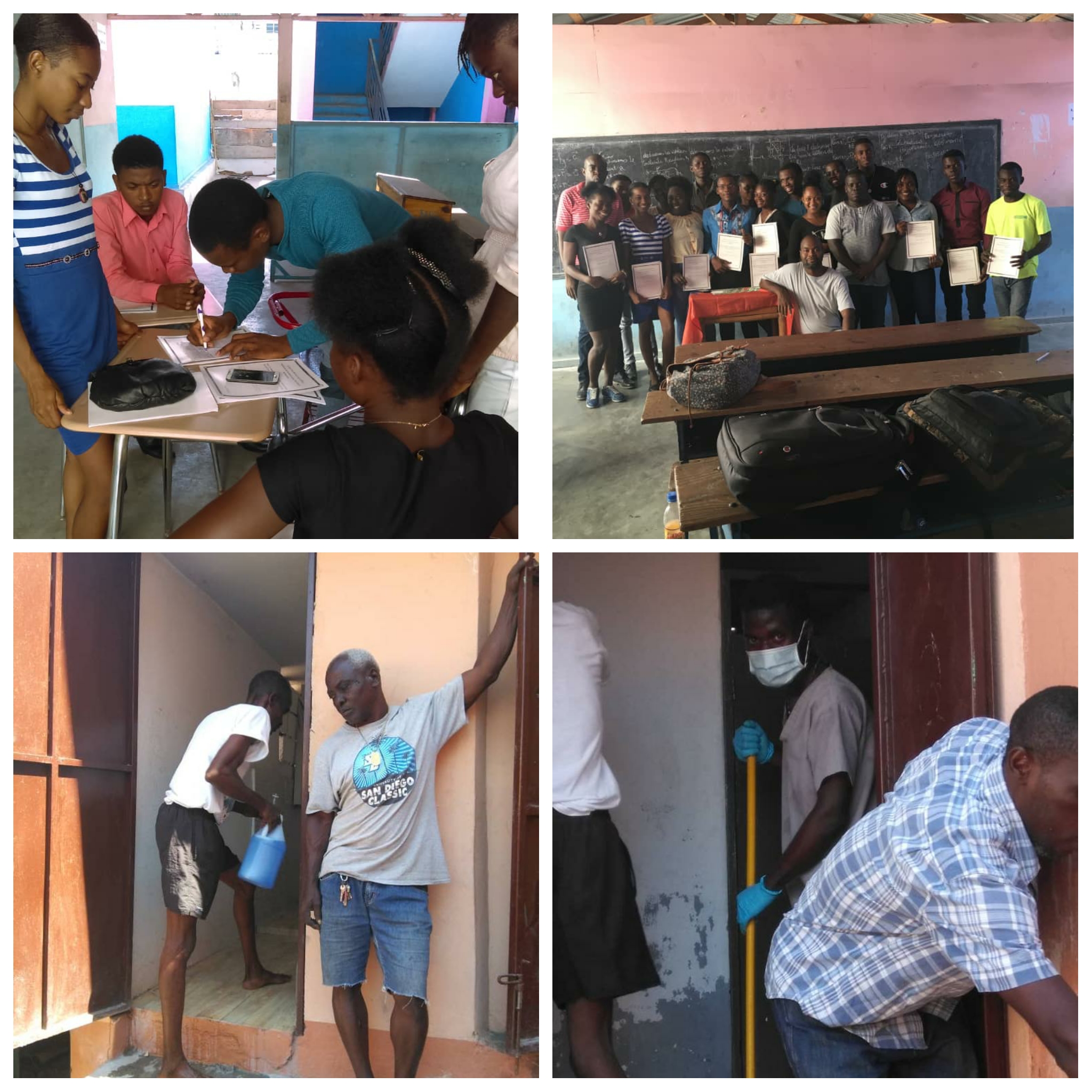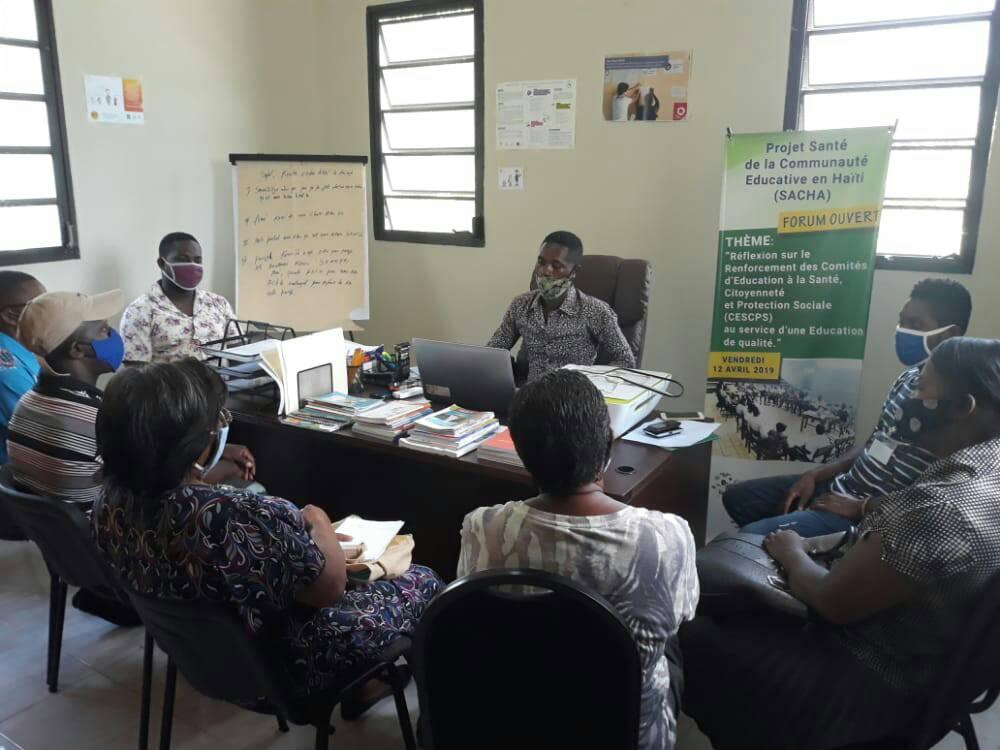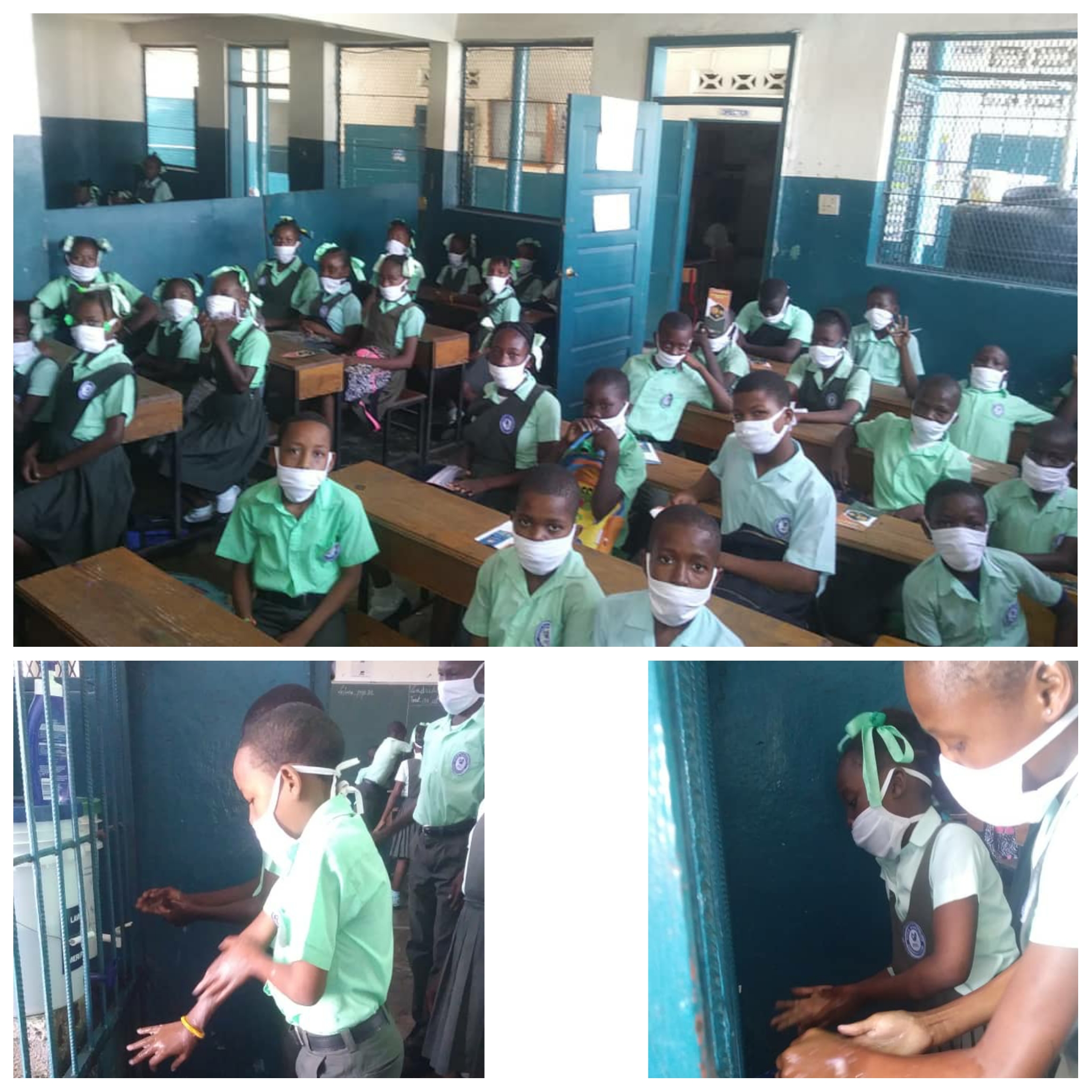SACHA – Educational Community Health in Haiti – is a project run by CEMEA-Haiti, a Haitian popular education association, supported by Wallonie Bruxelles International and coordinated internationally by the ESN for over a year now. Its objective is to contribute the improvement of the quality of education by promoting health and well-being at school in six establishments in the Haitian capital.
On the eve of schools reopening on the island, in a tense climate due to the complex socio-political context and today’s difficult health situation, the project leaders and beneficiaries are rallying to keep the SACHA project alive. This passion reflects the resilience and commitment of these people to a project which is all the more necessary for educational communities in this period of coronavirus crisis.
SACHA – Educational Community Health in Haiti – is a project run by CEMEA-Haiti, a Haitian popular education association, supported by Wallonie Bruxelles International and coordinated internationally by the ESN for over a year now. Its objective is to contribute the improvement of the quality of education by promoting health and well-being at school in six establishments in the Haitian capital.
On the eve of schools reopening on the island, in a tense climate due to the complex socio-political context and today’s difficult health situation, the project leaders and beneficiaries are rallying to keep the SACHA project alive. This passion reflects the resilience and commitment of these people to a project which is all the more necessary for educational communities in this period of coronavirus crisis.
Empowering educational communities
While health insecurity and unsanitary conditions continue to be a major problem in Haitian public schools, 6 schools in Port-au-Prince are rallying through the SACHA project to promote the engagement with and autonomy of educational communities on health issues in school spaces. The aim of this project is therefore to raise awareness of these issues within educational communities and encourage them to take action on the hygiene and health of pupils and teachers in order to promote better learning and working conditions. To this end, the project’s activities revolve around 3 main areas:
-
Strengthening the Health Education, Citizenship and Social Protection Committees (CESCPS):
These are committees set up within the participating schools, and are participatory decision-making bodies bringing together pupils, parents and representatives of the educational body in order to make them active on the subject of school health.
At the launch of the project, an open forum was organised in the presence of the different stakeholders. Sanitation and hygiene, mental health, waste management and sex education were among the themes identified by the committee members and then discussed prior to a project management training course led by Solidarité Laïque, a partner of the project. The goal? To prepare them to pilot health promotion projects in their respective schools according to their needs.
The SACHA project’s activities include the creation of tools to enable them to carry out their own awareness-raising activities in their schools. For example, a guide to facilitating collective intelligence has been produced. It is available in French and in Creole.
-
Mobilisation of teaching staff and education unions:
Education workers are the best ambassadors for health and social protection in the educational sphere, so it is essential that they are adequately informed on these issues. The SACHA project thus provides training sessions by experts in health, citizenship and social protection, so that teachers can be aware of their rights in terms of occupational health. The idea is that they may take this knowledge, bring it to their peers and be actors of change.
-
A Research-Action approach:
The project is joined by academics to evaluate, model and provide recommendations for replicating it in other regions or countries.
The Haitian student Jean-Ricard Florestal is therefore responsible for monitoring the activities of the committees and conducting surveys of committee members on their needs. He is assisted in his research work by the teacher and researcher Obrillant Damus in collaboration with the UNESCO Chair in Education and Health. Jean-Ricard also had the opportunity to present the activities and scope of the SACHA project to the Network partners during his visit to Paris and then Brussels last March.
Pandemic and successive political crises
Since the launch of the project, the committees have initiated several activities on the subjects of health, cleanliness, and sanitation for pupils and staff, which shows encouraging signs of consolidation of the committees. However, this dynamic was severely disrupted as the project began the execution of its 2nd phase, with new training activities planned.
It goes without saying that the situation in Haiti is critical. The country, which has been suffering from political and economic instability for many years now, was the scene of successive crises at the end of 2019. These tensions had a considerable impact on the lives of Haitian people and the local educational community as schools had to remain closed for almost 4 months.
Classes were able to restart at the beginning of 2020, and the committees therefore began operating again. Fritz Pierre Louis Sixth Form organised a training day for health mentor students, and the Municipal School of St Martin organised an infrastructure sanitation day in February in Port-au-Prince.

Haitian education unions were also beginning to implement their actions.
The National Union of Students and Educators of Haiti (UNNOEH) organised 3 series of conference-debates on the following themes: “Hygiene: the role of teachers in raising awareness of a hygienic environment” and “How can a safe school environment have a positive impact on the mental health of teachers and learners?”. In the presence of 110 people, these exchanges led the teachers to express their willingness to bring these health topics to the attention of their colleagues in their respective school environments.
UNNOEH also indicated its ambition to use the results of these activities to structurally address the issue of health within the Haitian education system. In particular, by advocating for the provision of quality health insurance to enable teachers to take proper care of their health.
But the pandemic has once again turned everything upside down.
As the schools were closed again for several months, the project’s activities were slowed down. CEMEA-Haiti, which is in charge on location, has however endeavoured to maintain a link with the members of the committees. It shared information, educational tools and useful links with them, enabling them to be properly informed about the health situation.
As lockdown is gradually lifting across the country, the challenge now is to organise an efficient resumption of the project’s activities in the delicate context of COVID-19.
Reopening schools and prospects for committees
Haiti is still facing a health crisis as a result of the COVID-19 epidemic, which continues to intensify week after week. The general lockdown measures have been lifted and the reopening of schools took place on 10 and 17 August across the country. However, the social and political climate remains tense, with social movements led by the political opposition and mobilisations of education unions.
The ESN is in regular contact with CEMEA-Haiti, which is in charge of coordinating the project on location. Despite the slowdown in activities caused by the situation, CEMEA-Haiti has managed to keep in touch with project participants via digital channels and recently organised a face-to-face informational meeting. At the meeting information on the health situation (in order to fight against fake news), pedagogical tools and any useful links were shared with the members of the committees in order to best prepare for the reopening of the schools and in anticipation of the project’s activities resuming.

The heads of the project committees have expressed their concern about the schools reopening, which they consider to be premature. No provision has been made for support from the relevant Ministry, even though, for example, schools are required to accommodate a maximum of 20 pupils per class in order to respect social distancing. This directive poses a major problem as some classes can have up to 80 pupils.
Limiting the class to 20 students requires the establishment of a rotation system which, according to committee members, will result in students being able to attend only 10 days of classes in total.
This is not enough, given that this resumption of classes will have to end in November with the pupils’ end-of-year exams. In such a short learning time, and after several months without school, it would be impossible for their knowledge to be at the right level for the exams.
Another point of concern is the lack of protection against Covid. The schools participating in the SACHA project are public schools, so they have little financial and material means to cope with the pandemic. In the absence of support from the authorities, they find themselves with very little money, all the more so since, according to the committee members, many parents do not buy masks for their children, believing that it is up to the State to do so in the context of sending pupils back to school.
The meeting of the committees and project leaders was therefore an opportunity to discuss the measures they can put in place with their resources to help reduce the risks of transmission of the disease. Several solutions have been imagined, such as creating groups of pupils to pass through the classrooms each morning to remind them of the importance of respecting protective measures. One of the establishments, the municipal school Dumarsais Estimé, also organised a day of prevention and hygiene against COVID-19 on 21 August. Pupils were given masks and participated in awareness-raising and hand-washing activities.
Other meetings between the committees and CEMEA-Haiti are scheduled in the coming weeks to determine the implementation and carrying out of future actions. A survey was also conducted to gather information on the health and well-being of project participants and their expectations. It reports an imminent need for support for pupils and educational staff in the process of returning to school, and a high level of stress, particularly in relation to the current tensions in the educational environment.

Finally, the ESN plans to produce short films and make them available to educators and trade union members who can use them to strengthen their skills and conduct their own workshops.
In these training videos, experts identified by ESN and its members, with the support of CEMEA-Haiti and Solidarité Laïque Haiti, will present information on the themes of social protection, citizenship and the health of educational communities in relation to the needs previously expressed by the beneficiaries.
This is an initiative currently under development that will bring together Haitian and European researchers and ESN partners.




